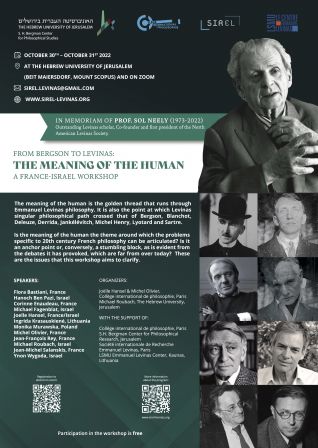A France-Israel Workshop on French philosophy
Par David le samedi 22 octobre 2022, 21:22 - Lien permanent

From Bergson to Levinas: « The meaning of the human »
Sunday, October 30th – Monday, October 31st 2022
At the Hebrew University of Jerusalem
(Beit Maiersdorf, Mount Scopus) and on Zoom
In memoriam of Prof. Sol Neely (1973-2022)
Outstanding Levinas scholar
Co-founder and first president of the North American Levinas Society
Organizers:
Joëlle Hansel & Michel Olivier (Collège international de philosophie, Paris)
Michael Roubach (The Hebrew University, Jerusalem)
With the support of:
Collège international de philosophie, Paris
S.H. Bergman Center for Philosophical Research, Jerusalem
Société Internationale de Recherche Emmanuel Levinas, Paris
LSMU Emmanuel Levinas Center, Kaunas, Lithuania
Registration to attend on zoom +program:
https://u-paris.zoom.us/meeting/register/tZcsfumgqDstE9SLwDbXxMQru07kGd02tHUS
To download the program / pour télécharger le programme: click here
Presentation (français suit)
Theoretical works, novels, poetry, essays, literary, artistic or cinematographic criticism, theater, music: the diversity of genres that 20th century French philosophy has borrowed from bears witness to its remarkable fertility. Contrary to the compartmentalization that is often established between them, intense interactions have taken place between philosophy, literature and aesthetics. This is illustrated, each in its own way, by the work of Bergson, Levinas, Blanchot, Deleuze, Derrida, Jankélévitch, Michel Henry, Lyotard and Sartre.
Emmanuel Levinas holds a singular place in this constellation of philosophers who were his contemporaries and, for the most part, his interlocutors. The Bible and literature made him discover the fundamental problem of the meaning of the human. This question is the "golden thread" that runs through his work, from the first writings of the 1930s to the last texts of the 1990s. It is also the point at which his path of thought crossed that of other 20th century French philosophers.
Is the question of the "meaning of the human" the theme around which the questions specific to French philosophers of the 20th century can be articulated? Is it an anchor point or, conversely, a stumbling block, as is evident from the debates it has provoked, which are far from over today? These are the issues that our conference aims to clarify.
Présentation
Œuvre théorique, roman, poésie, essai, critique littéraire, artistique ou cinématographique, théâtre, musique : la diversité des genres qu’a empruntés la philosophie française du 20e siècle témoigne de sa remarquable fécondité. À l’encontre du cloisonnement que l’on instaure souvent entre elles, des interactions intenses ont eu lieu entre la philosophie, la littérature et l’esthétique. C’est ce qu’illustre, chacune à sa manière, l’œuvre de Sartre, Levinas, Blanchot, Jankélévitch, Deleuze, Lyotard et Derrida.
Emmanuel Levinas tient une place singulière dans cette constellation de philosophes qui ont été ses contemporains et, pour la plupart, ses interlocuteurs. La Bible et la littérature lui ont fait découvrir le problème fondamental du sens de l’humain. Cette question est le « fil d’or » qui traverse son œuvre, depuis les premiers écrits des années 1930 jusqu’aux derniers textes des années 1990. Elle est aussi le point sur lequel son chemin de pensée a croisé celui d’autres philosophes français du 20e siècle.
La question du « sens de l’humain » est-elle le thème autour duquel peuvent s’articuler les interrogations, par ailleurs fort différentes, propres aux philosophes français du 20e siècle ? Est-elle un point d’ancrage ou, inversement, une pierre d’achoppement, comme cela ressort des débats qu’elle a suscités et qui sont loin d’être clos aujourd’hui ? Tels sont les problèmes que notre colloque se propose de clarifier.
Participants:
Flora Bastiani, Université de Toulouse-Jean Jaurès, France
Hanoch Ben Pazi, Bar Ilan University, Israel
Corinne Enaudeau, professeur honoraire en classes préparatoires, France
Michael Fagenblat, Open University, Israel
Joelle Hansel, Collège international de philosophie, Paris/Jerusalem
Ingrida Krasauskienė, Head of Emmanuel Levinas Center, Kaunas, Lithuania
Monika Murawska, Academy of Fine Arts in Warsaw, Poland
Michel Olivier, Collège international de philosophie, Université Paris-Nanterre, France
Jean-François Rey, professeur honoraire, Université d'Artois, France
Michael Roubach, The Hebrew University of Jerusalem, Israel
Jean-Michel Salanskis, Université Paris-Nanterre, France